Two African countries that are strong supporters of the Palestinian people are facing turmoil amid the ongoing violence between Israel and Hamas. South Africa's diplomatic links with Israel have soured following what it called the "unfortunate conduct" of the Israeli ambassador - while Tunisian lawmakers are at odds with the president over a bill criminalising ties with Israel.
South Africa described the targeted killings of civilians in Gaza by the Israeli armed forces as war crimes, crimes against humanity and genocide - three of the crimes within the jurisdiction of the International Criminal Court (ICC).
"These are not indisciminate attacks by Israel ... We've seen hospitals, schools, bakeries being targeted," said Zane Dangor, the director-general of South Africa's Department of International Relations and Cooperation (DIRCO).
"It's all meant to make the lives of the people in Gaza impossible."
On Thursday Dangor met with Israel's ambassador to South Africa, Eliav Belotsercovsky, who faced a formal reprimand because of "continuing disparaging remarks ... about those who are opposing the atrocities and the genocide of the Israeli government".
Dangor told Belotsercovsky that South Africa would ask the ICC to speed up its investigations into the situation in the Palestinian territories, and to include the most recent atrocities in the scope of its investigations.
"A genocide under the watch of the international community cannot be tolerated," said Khumbudzo Ntshavheni, the Minister in the Presidency.
"Another holocaust in the history of humankind is not acceptable."
Appeal for ceasefire
South Africa once again called for an immediate comprehensive ceasefire, the opening of humanitarian corridors, and the release of all civilian hostages.
"If Israel commits to a ceasefire, not a pause, then we can talk about restoring peace and resuming negotiations," Dangor told RFI.
DIRCO acted under instructions from South Africa's cabinet to withdraw its diplomatic staff from Tel Aviv and issue a formal reprimand to the Israeli ambassador.
"We felt it important that we should call the ambassador in, and really he should desist from making the kinds of statements he's making, without having had any discussion with senior members of the government of South Africa," said Naledi Pandor, the country's Minister of International Relations.
Pandor said there seems to be a "strange practice among some ambassadors in South Africa that they can just say what they like".
She was referring to comments made by the United States ambassador who said South Africa had supplied arms to Russia to help its ally in the Ukraine war.
WATCH | Closing Statement by Minister Pandor on the ongoing Israel-Palestine con... https://t.co/538bqPbNUJ-- DIRCO South Africa (@DIRCO_ZA) November 7, 2023
Back in 2018, South Africa withdrew its ambassador from Israel in response to the Israeli government's ongoing expansion of its settler policy. Since 2019, the government has decided not to replace the ambassador. It has since maintained a small team of lower level diplomats in a liaison office.
Last month, Nomvula Mokonyane, deputy secretary general of the ruling African National Congress, called for a boycott of Israeli imports in reaction to Israel's armed retaliation in Gaza.
Mokonyane stressed that the ANC's criticism of what it calls an "apartheid regime", imposed by the Israeli government against the Palestinians does not mean that the ANC is "anti Jews".
Standoff in Tunisia
Meanwhile, in Tunisia, the Israeli-Hamas conflict has created a rift between MPs and President Kais Saied who last week scrapped a bill criminalising the normalisation of relations with Israel.
Saied has long maintained that normalising relations with Israel would be "akin to high treason".
The bill called for jail sentences for any person of Tunisian nationality who maintained relations with "the Zionist entity [...] which calls itself Israel".
It was under discussion at the national assembly when the president performed a U-turn, and decided it would not be in Tunisia's international interests.
Saied added that Tunisia's intention was to free the Palestinian people rather than criminalise rapport with Tel Aviv.
One of Saied's staunch allies, Mahmoud ben Mabrouk, called for a referendum on the issue.
The MPs said that they intend to examine the bill at a later date and will not deal with any other topic until this bill is put to vote.
This marked the first time members of the national assembly - whose powers have been greatly reduced since Saied grabbed control of the country in 2021 - have dared show defiance against the president, a year out from general elections.
If Saied rejects the bill, he is likely to severe ties with most of the MPs; if he approves it, he will put Tunisia in a difficult position on the international scene.


